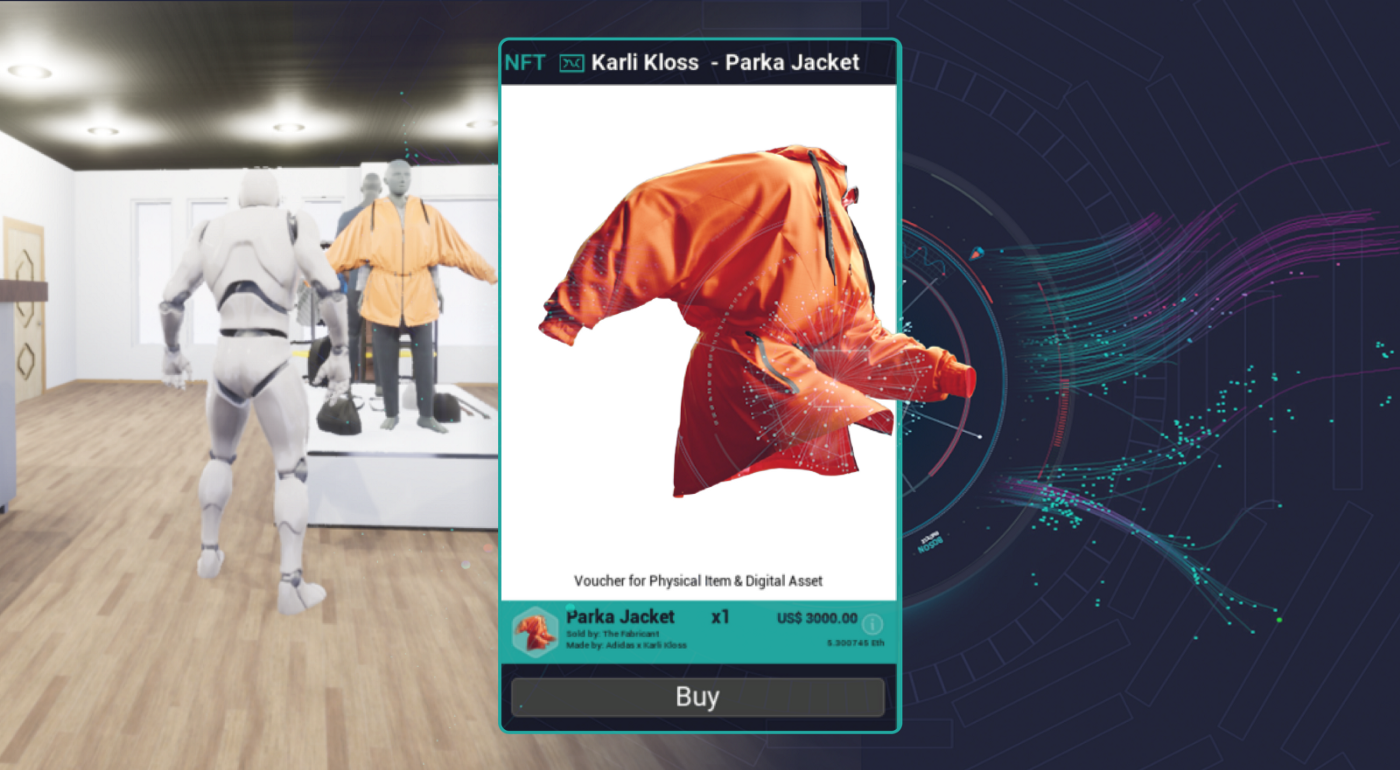Metaverse eCommerce: A Comprehensive Guide [2023]
Exploring eCommerce in the Metaverse in 2023

Table of Contents
I. Introduction
The 'metaverse' is a concept that has been gaining traction in recent years. The metaverse can be defined as a conglomeration of virtual worlds which can be accessed by web browsers, gaming consoles, and VR/AR based applications. Platforms that can be considered a 'metaverse' have been seeing monthly active users reach all-time highs in recent months.
At its core, the metaverse is a shared virtual space where users can interact with each other and with digital content in real-time. In 2023, the Metaverse is majority browser based games. More particularly, virtual world games such as Roblox and Fortnite. These virtual spaces allow users all over the world to connect in one location with their avatars, and is not limited by physical boundaries, making it a truly global and interconnected network of virtual worlds.
The metaverse offers a wide range of possibilities for businesses and entrepreneurs, including eCommerce and the use of blockchain technology to sell digital collectibles. In this article, we will explore the potential of metaverse eCommerce, its benefits, barriers to entering, and examples of how this can be applied.

II. The Potential of the Metaverse for eCommerce
The metaverse offers a unique and highly immersive environment that has the potential to transform the eCommerce industry. From virtual showrooms and retail stores, all the way to augmented reality try on and gamified experiences, the potential for metaverse and eCommerce is impressive due to all of what is possible.
Here are some key features of the metaverse that make it an attractive platform for eCommerce:
Global Reach
The metaverse is not limited by physical boundaries, making it a truly global platform for eCommerce. Businesses can reach customers from all over the world, without the need for physical stores or warehouses.
Efficiency
By creating virtual environments that allow customers to try on and interact with products, businesses can reduce the need for physical showrooms and sample products, leading to cost savings and increased efficiency.
Sustainability
Virtual try-on and showroom experiences offer a more sustainable and environmentally friendly approach to retail, as they reduce the need for physical products and showrooms.
Personalized Experiences
The metaverse allows for highly personalized experiences, with the ability to create custom avatars and environments that reflect a user's preferences and interests. This can lead to a more engaging and memorable shopping experience.
Social Interactions
This takes traditional social media marketing interactions to a whole new level. The metaverse is a social platform at its core, allowing users to interact with each other and with brands in real-time. This can lead to a stronger sense of community and brand loyalty through immersive, gamified and rewarding experiences.

III. Virtual Marketplaces
As the metaverse continues to gain traction, we are witnessing the rise of virtual marketplaces that are transforming the way we think about eCommerce. These marketplaces are created within the metaverse, allowing businesses to sell products and services directly to users in a highly immersive and interactive environment.
The benefits of virtual marketplaces in the metaverse are numerous. First and foremost, they offer businesses the opportunity to reach a global audience of users who are highly engaged and motivated to shop. Because the metaverse is not bound by physical constraints, businesses can offer an infinite range of products and services without worrying about issues like inventory or shipping.
Another key benefit of virtual marketplaces in the metaverse is the ability to create highly personalized and immersive experiences for customers. By leveraging the unique features of the metaverse, such as virtual showrooms and personalized avatars, businesses can create shopping experiences that are truly unique and memorable. This can lead to higher levels of customer loyalty and satisfaction, as well as increased sales and revenue particularly when you think about the next 10 years and the trends in digital consumerism.
There are many emerging virtual marketplaces within metaverses, however one drawback is the approach many brands are taking in their efforts to capitalize on virtual worlds once they've entered the space. With a calculated approach from dedicated metaverse advertising professionals, such as the team at Meta Marketing Agency, your team will have the support and expertise they need in order to successfully execute your metaverse campaign.
IV. Virtual Try-On Experiences
Virtual try-on experiences are becoming increasingly popular on social media, as well as bridging into in the metaverse, as businesses explore new ways to engage customers and enhance the shopping experience.
Here are some of the key benefits of virtual try-on and showroom experiences, as well as examples of how businesses are using them:
Benefits of Virtual Try-On Experiences:
- Personalization: Virtual try-on and showroom experiences allow businesses to create highly personalized and engaging experiences for customers.
- Efficiency: By creating virtual environments that allow customers to try on and interact with products, businesses can reduce the need for physical showrooms and sample products, leading to cost savings and increased efficiency.
- Sustainability: Virtual try-on and showroom experiences offer a more sustainable and environmentally friendly approach to retail, as they reduce the need for physical products and showrooms.
Examples of Virtual Try-On in the Metaverse:
- Fashion: Some fashion brands have created virtual showrooms that allow customers to try on and interact with virtual versions of their clothing.
- Beauty: Beauty brands have created virtual makeup try-on experiences that use advanced augmented reality technology to create a highly realistic and engaging experience.
Tips for Brands Looking to Leverage A/R Try-On:
- Identify the products that are best suited for virtual try-on and showroom experiences, based on factors such as product complexity and customer preferences.
- Use advanced virtual reality and augmented reality technology to create highly realistic and engaging experiences for customers.
- Promote virtual try-on and showroom experiences through social media and other digital channels, to increase awareness and drive traffic to your virtual storefront.
In summary, virtual try-on and showroom experiences offer a range of benefits for businesses, including personalization, efficiency, and sustainability.
By leveraging the unique features of the metaverse and using advanced technology, businesses can create highly engaging and interactive experiences that enhance the customer experience and drive sales.

V. Advertising and Marketing in the Metaverse
The metaverse offers a unique and highly immersive environment that has the potential to transform the way we think about advertising and marketing. As more and more businesses look to the metaverse as a new platform for eCommerce, they are also beginning to explore the potential of gamification as a form of marketing.
One of the key advantages of advertising and marketing in the metaverse is the ability to create highly personalized and engaging experiences for customers. Because the metaverse is a highly social and interactive environment, businesses can leverage this to create targeted and relevant ads that resonate with their target audience. For example, a fashion brand could create virtual billboards or storefronts that showcase their latest products, using the unique features of the metaverse to create a highly engaging and memorable ad experience.
In addition to traditional advertising methods, the metaverse also offers new and innovative ways to market products and services. For example, businesses can create virtual events or experiences that allow customers to interact with their brand in a more immersive and interactive way. This can lead to higher levels of brand awareness and customer engagement, as well as increased sales and revenue.
However, there are also challenges to advertising and marketing in the metaverse. One of the key challenges is the need to balance advertising with the user experience. Because the metaverse is a highly social environment, users may be put off by ads that are overly intrusive or disruptive. To address this, businesses must take a more strategic and targeted approach to advertising in the metaverse, focusing on creating ads that are relevant, engaging, and non-intrusive.
In summary, the metaverse offers a unique and highly engaging environment that has the potential to transform the way we think about advertising and marketing by opening doors to digital experiences and gamification. By leveraging the unique features of the metaverse, businesses can create highly personalized and immersive ad experiences that resonate with their target audience.
VI. Social Commerce
Social commerce refers to the use of social media platforms to sell products or services. In the metaverse, social commerce takes on a new dimension, as it combines the immersive experience of the virtual world with the social engagement of social media.
The potential for social commerce in the metaverse is huge. By leveraging the social features of the metaverse, businesses can create engaging and interactive shopping experiences for their customers. For example, they can host virtual shopping parties or launch events that allow customers to try on new products and get feedback from their friends and followers.
Examples of popular social commerce in the metaverse include:
- Roblox, a popular metaverse platform amongst Gen-Z, where users can buy and sell virtual items, including clothing, accessories, and even virtual pets using their debit cards. Many of these transactions take place in social settings, such as virtual parties or hangouts. Brands should focus on quality experiential and immersive metaverse marketing experiences to help boost sales and maximize awareness.
- Decentraland, another metaverse platform, features a virtual marketplace where users can buy and sell digital collectibles, including virtual real estate and artwork. Users can also attend virtual events and exhibitions to discover new artists and creators. Decentraland is rapidly emerging as a hot-bed for brands to get their 'feet wet' in the metaverse for the first time, with calculated approaches targeting certain demographics of their audience. Earlier in 2023, Decentraland has added the features to be able to purchase digital collectibles (NFTs) from their platform with debit/credit cards, which is massive news for brands looking to enter the metaverse looking to obtain an ROI!
As the metaverse continues to evolve, we can expect to see more businesses and brands explore the potential of social commerce in this exciting new space.
VII. Conclusion
In conclusion, the metaverse offers enormous potential for the eCommerce industry. With its unique features and capabilities, businesses can create personalized and immersive experiences for their customers, expanding their reach and revenue potential on a global scale.
The rise of virtual marketplaces, advertising and marketing, and virtual try-on experiences within the metaverse have proven that this new paradigm is gaining momentum, and we can expect to see more businesses and entrepreneurs embrace this technology in the coming years.
As the metaverse continues to evolve, we may see new and innovative ways to conduct eCommerce that we cannot even imagine today. The future of eCommerce lies within the metaverse, and businesses that embrace this new paradigm will be well-positioned to reap the benefits of this transformational technology.
Recapping The Article
The metaverse is emerging as a new frontier of eCommerce with all of the benefits included. Most importantly, it's scalability, sustainability and global reach factors. Along with the implementation of Ai chatbots in virtual avatars, the metaverse has the ability to revolutionize eCommerce on a scale that hasn't been seen before in digital consumer technology.
If you are looking to capitalize on the opportunities that the metaverse provides to brands who enter early, you should look to contact a metaverse agency that specializes in providing a gateway to the virtual world with a complimentary consultation.
























